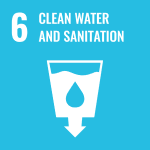Document Type
Article
Publication Date
6-25-2019
Keywords
bitumen-derived organics, mixture fractionation, effects-directed analysis, ultrahigh resolution mass spectrometry, synchronous fluorescence spectroscopy, oil sands process-affected water
Abstract
The surface mining of oil sands north of Fort McMurray, Alberta produces considerable tailings waste that is stored in large tailings ponds on industrial lease sites. Viable strategies for the detoxification of oil sands process affected water (OSPW) are under investigation. In order to assess the toxic potential of the suite of dissolved organics in OSPW, a method for their extraction and fractionation was developed using solid phase extraction. The method successfully isolated organic compounds from 180 L of an aged OSPW source. Using acidic- or alkaline-conditioned non-polar ENV+ resin and soxhlet extraction with ethyl acetate and methanol, three fractions (F1–F3) were generated. Chemical characterization of the generated fractions included infusion to electrospray ionization ultrahigh-resolution mass spectrometry (ESI-UHRMS), liquid chromatography quadrupole time-of-flight mass spectrometry, gas chromatography triple quadrupole time-of-flight mass spectrometry, and synchronous fluorescence spectroscopy (SFS). Additionally, ESI-UHRMS class distribution data and SFS identified an increased degree of oxygenation and aromaticity, associated with increased polarity. Method validation, which included method and matrix spikes with surrogate and labelled organic mono carboxylic acid standards, confirmed separation according to acidity and polarity with generally good recoveries (average 76%). Because this method is capable of extracting large sample volumes, it is amenable to thorough chemical characterization and toxicological assessments with a suite of bioassays. As such, this protocol will facilitate effects-directed analysis of toxic components within bitumen-influenced waters from a variety of sources.
Faculty
Faculty of Applied Science &Technology (FAST)
Journal
The Science of the Total Environment
Volume
671
First Page
587
Last Page
597
Version
Publisher's version
Peer Reviewed/Refereed Publication
yes
Copyright
© Anthony E. Bauer, R. A. Frank, J. V. Headley, C. B. Milestone, S.Batchelor, K.M.Peru, M.D.Rudy, S.E.Barrett, R.Vanderveen, D.G.Dixon, & L.M.Hewitt, 2019
Terms of Use
Terms of Use for Works posted in SOURCE.
Creative Commons License

This work is licensed under a Creative Commons Attribution-Noncommercial-No Derivative Works 4.0 License.
Original Publication Citation
Bauer, A. E., Frank, R. A., Headley, J. V., Milestone, C. B., Batchelor, S., Peru, K. M., . . . Hewitt, L. M. (2019). A preparative method for the isolation and fractionation of dissolved organic acids from bitumen-influenced waters. The Science of the Total Environment, 671, 587-597. doi:10.1016/j.scitotenv.2019.03.244
SOURCE Citation
Milestone, Craig B.; Bauer, Anthony E.; Frank, R. A.; Headley, J. V.; Batchelor, S.; Peru, K. M.; Rudy, M. D.; Barrett, S. E.; Vanderveen, R.; Dixon, D. G.; and Hewitt, L. M., "A Preparative Method for the Isolation and Fractionation of Dissolved Organic Acids from Bitumen-influenced Waters" (2019). Publications and Scholarship. 67.
https://source.sheridancollege.ca/fast_publications/67
Included in
Environmental Indicators and Impact Assessment Commons, Environmental Monitoring Commons, Oil, Gas, and Energy Commons



